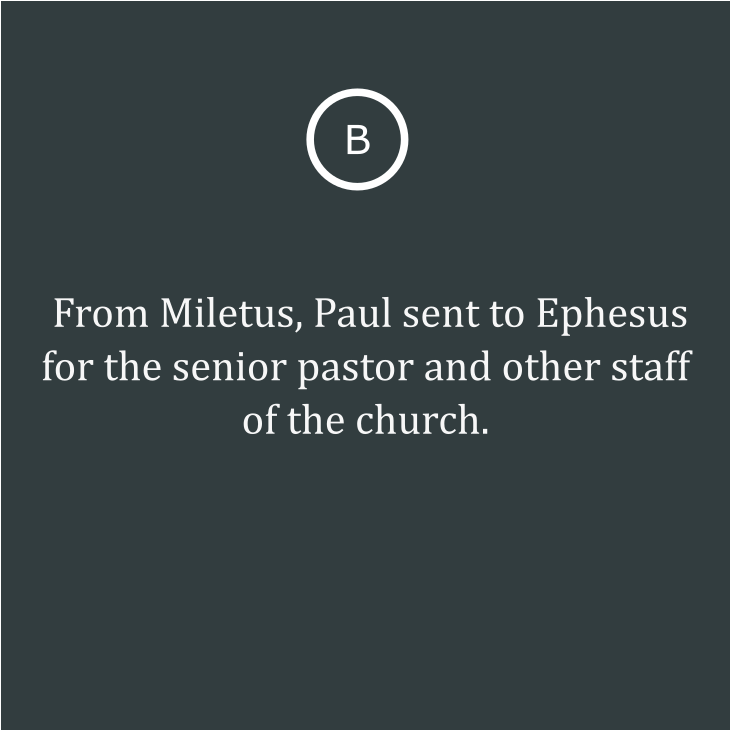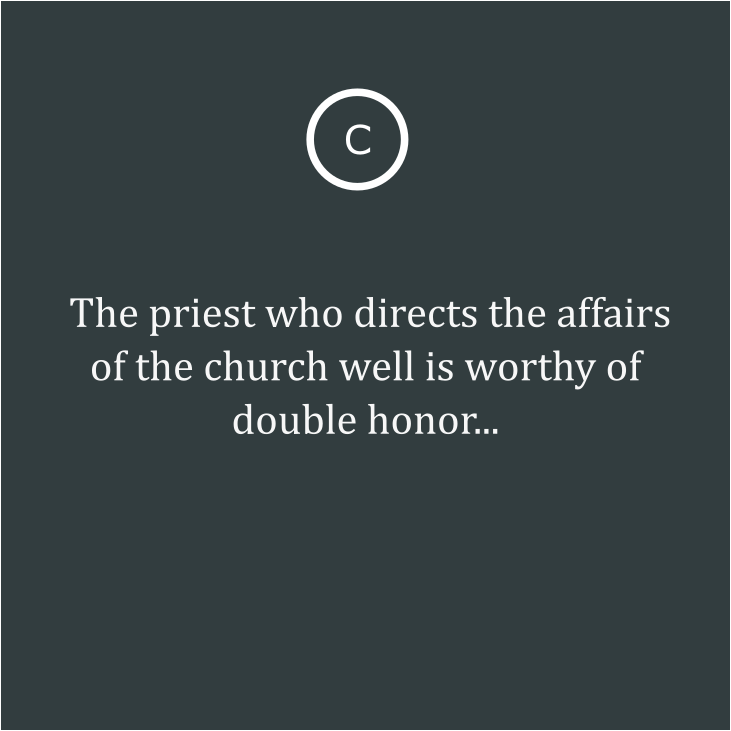- Home
- Biblical Church
-
Biblical Leadership
- Biblical Church Leadership
- Plural Leadership
- Elders Instead of Priests/Pastors
- Biblical Titles for Church Leaders
- Qualities of Church Leaders
- Christ-Centered Instead of Consumer-Driven
- Shepherding the Flock
- Biblical Burdens
- Two by Two
- Leadership Undeveloped
- Gifts of Men
- Biblical Board Meetings
- Biblical Budgets
- Board of Prayer
-
Biblical Living
- Praying for One Another
- Confession of Sin
- Biblical Worship
- Denying Oneself to Follow Jesus
- Using Spiritual Gifts
- Celebrating Communion
- Let No Debt Remain Outstanding
- Offering Hospitality
- Eating Together
- Fasting
- Personal Performances
- Make a Joyful Noise
- Biblical Conflict Resolution
- Biblical Marital Roles
- Biblical Thinking
- Biblical Mission
- Brother Barnabas Blog
- About
- Support DBC
- Contact
- For-WORD
- DBC Videos
- Get the Free E-Book
- Links and Resources
- List of Articles
Which of the following is a correct quote?
A) To all the saints in Christ Jesus at Philippi, together with the overseers and deacons:
B) To all the saints in Christ Jesus at Philippi, together with the senior pastor and staff:
C) To all the saints in Christ Jesus at Philippi, together with the bishop and priests:
(See Philippians 1:1 if you are not sure.)
A) From Miletus, Paul sent to Ephesus for the elders of the church.
B) From Miletus, Paul sent to Ephesus for the senior pastor and other staff of the church.
C) From Miletus, Paul sent to Ephesus for the priests and nuns of the church.
(See Acts 20:17 if you are not sure.)
A) The elders who direct the affairs of the church well are worthy of double honor...
B) The senior pastor who directs the affairs of the church well is worthy of double honor...
C) The priest who directs the affairs of the church well is worthy of double honor...
(See Timothy 5:17 if you are not sure)
B) To all the saints in Christ Jesus at Philippi, together with the senior pastor and staff:
C) To all the saints in Christ Jesus at Philippi, together with the bishop and priests:
(See Philippians 1:1 if you are not sure.)
A) From Miletus, Paul sent to Ephesus for the elders of the church.
B) From Miletus, Paul sent to Ephesus for the senior pastor and other staff of the church.
C) From Miletus, Paul sent to Ephesus for the priests and nuns of the church.
(See Acts 20:17 if you are not sure.)
A) The elders who direct the affairs of the church well are worthy of double honor...
B) The senior pastor who directs the affairs of the church well is worthy of double honor...
C) The priest who directs the affairs of the church well is worthy of double honor...
(See Timothy 5:17 if you are not sure)
(See Philippians 1:1 if you are not sure.)
(See Acts 20:17 if you are not sure.)
(See 1 Timothy 5:17 if you are not sure.)
By now most have you have it figured out – in every case the correct answer was “A” and the Biblical text referred to churches who had a plurality of leaders called elders who led the people and directed the affairs of the church. And if you thought the list above was kind of long and repetitive, it wasn't nearly as long as it could have been – there are many Biblical references to churches being led by elders!
Which begs the question, how many verses are there in the Bible that talk about churches being led by a senior pastor, a priest, a reverend, or any of the many other titles we give the head church leader? None. Nada. Zero. Zilch. There aren't any. Not even one. Hierarchical top-down dictatorship is not the Biblical model. Not even when it is modified by democratic processes such as elections and church boards. The overwhelming evidence is that God intended for His local churches to be led by a plurality of leaders called elders who were apostles, prophets, evangelists, pastors, and teachers who led the people, taught the Word, and directed the affairs of the church.
The Biblical evidence is so overwhelming and the concept is so simple to understand, why don't we do church leadership the way that the Bible tells us to more often? In most other areas of life – in our morals, our marriages, our behavior – we look to the Bible to be our guide and tell us what is right and what is wrong. Why don't we do the same when it comes to church leadership? Why do we insist that churches ought to be led by one man (or woman) when plural leadership is so clearly called for in the Bible? Plural leadership is seldom exercised for a variety of reasons, but here are three of the most common reasons given for ignoring the Biblical pattern for church leadership:
1) “It's always been that way.” We have been doing the current model of church led by a senior pastor/priest/reverend for centuries. Whole denominations are built on a top-down power structure and it would be very difficult to re-organize everything to a plural leadership structure where decisions are made by consensus and the leading of the Holy Spirit (as in Acts 15).
2) “I might lose my position.” If denominational structures were to change, men and women currently in power might have to share their authority or even step down from their positions. Full-time paid positions held by a few might turn into part-time or volunteer positions held by many. Full-time senior pastors and full-time professional staff might be replaced by a team of teachers, worship leaders, administrators, and helpers. Those in charge of the status quo have every reason to maintain the status quo.
3) “Plural leadership would never work.” Many sincere church leaders simply believe plural leadership would be too messy – too many meetings, people wouldn't get along, decisions wouldn't be made due to lack of agreement. There is a certain amount of wisdom to this view, but it is man's wisdom that comes from being in adversarial meetings where egos and agendas rule the day and the Holy Spirit, prayer, and Biblical values are ignored. Plural leadership worked in the book of Acts and is working well in many churches today, especially in churches that understand servant leadership and are committed to moving together in love and unity.
Which begs the question, how many verses are there in the Bible that talk about churches being led by a senior pastor, a priest, a reverend, or any of the many other titles we give the head church leader? None. Nada. Zero. Zilch. There aren't any. Not even one. Hierarchical top-down dictatorship is not the Biblical model. Not even when it is modified by democratic processes such as elections and church boards. The overwhelming evidence is that God intended for His local churches to be led by a plurality of leaders called elders who were apostles, prophets, evangelists, pastors, and teachers who led the people, taught the Word, and directed the affairs of the church.
The Biblical evidence is so overwhelming and the concept is so simple to understand, why don't we do church leadership the way that the Bible tells us to more often? In most other areas of life – in our morals, our marriages, our behavior – we look to the Bible to be our guide and tell us what is right and what is wrong. Why don't we do the same when it comes to church leadership? Why do we insist that churches ought to be led by one man (or woman) when plural leadership is so clearly called for in the Bible? Plural leadership is seldom exercised for a variety of reasons, but here are three of the most common reasons given for ignoring the Biblical pattern for church leadership:
1) “It's always been that way.” We have been doing the current model of church led by a senior pastor/priest/reverend for centuries. Whole denominations are built on a top-down power structure and it would be very difficult to re-organize everything to a plural leadership structure where decisions are made by consensus and the leading of the Holy Spirit (as in Acts 15).
2) “I might lose my position.” If denominational structures were to change, men and women currently in power might have to share their authority or even step down from their positions. Full-time paid positions held by a few might turn into part-time or volunteer positions held by many. Full-time senior pastors and full-time professional staff might be replaced by a team of teachers, worship leaders, administrators, and helpers. Those in charge of the status quo have every reason to maintain the status quo.
3) “Plural leadership would never work.” Many sincere church leaders simply believe plural leadership would be too messy – too many meetings, people wouldn't get along, decisions wouldn't be made due to lack of agreement. There is a certain amount of wisdom to this view, but it is man's wisdom that comes from being in adversarial meetings where egos and agendas rule the day and the Holy Spirit, prayer, and Biblical values are ignored. Plural leadership worked in the book of Acts and is working well in many churches today, especially in churches that understand servant leadership and are committed to moving together in love and unity.
"We have bought into a consumer model of church where a select few do all the work while everyone else sits around and votes on their performance with their feet and their pocketbooks."
So with so many people uncomfortable with plural leadership, why should we bother to bring it up? Why contend for change? Because it is Biblical; it is the way God intended churches to be. We ignore Biblical truth to our own peril; many churches are weak today because they are led by one or two paid professionals who spend more time trying to please their customers rather than pleasing God. We have bought into a consumer model of church where a select few do all the work while everyone else sits around and votes on their performance with their feet and their pocketbooks. Success is measured in terms of finances and attendance rather than lives being changed or God being pleased.
We must get back to Biblical church if we are to have any hope of being the Body of Christ that God intends us to be. As long as one or two people are calling the shots and a handful of people are doing the ministry, the majority of the Body (80%? 90%?) is sitting idle, doing very little for God, failing to be the light of the world or ambassadors for Christ. This silent majority may go to church on Sunday or watch on YouTube but they are not an active part of the Body of Christ and the Body is weaker because of it.
Let's Pray Together: Lord, help us all to become active members of the Body of Christ, not just spectators. Help me to encourage others to be active members of the Body and not just spectators. Help me and my church leaders to make room for everyone to participate and be a part of Your Body. Give me and my church leaders wisdom in how to make changes that would make our local church body more in line with the plural leadership model that is described in the New Testament. I pray for these leaders now that I bring before You... (continue praying as you feel led
Related Resources:
Church Government -- Why Elders? A video by Pastor Scott Harrison of Living Hope Community Church
Christian, Your Job Is a Ministry Job An article by Jon Bloom at desiringGod.org
What Others Are Saying:
"Throughout our history we have tried many schemes hoping that our corporate decisions will reflect God’s will. Very early on, local bishops took on nearly autocratic power. Eventually that evolved into a hierarchy of bishops, which claimed apostolic succession dating back to Peter. Not only did this claim have significant gaps, but it also germinated a leadership bureaucracy that is foreign to Scripture. Other denominations have tried the same approach and fared no better. In more recent centuries, many congregations have opted for more local determination to utilize either a council of elders or democratic voting of the membership. Today the single elder/senior pastor model puts authority in the lap of someone supposedly anointed to represent Jesus to the local community.
The fact that all of them claim a Scriptural basis might lead us to believe that Scripture doesn’t clearly offer one. Not surprisingly, each of these styles reflect the cultural trends of their day. The hierarchy of bishops is just royalty cloaked in Christian garb. Congregational forms emerged at the same time royalty was being dislodged by democratic movements. The strong-armed senior pastor is a copy of the corporate CEO, who can cast a vision and reward those who follow.
All of these forms are grounded in the old creation where power is negotiated to find out who gets to decide what is God’s will for others. Those in power want us to believe that the process itself guarantees that they speak for Jesus and that the faithful must follow. It doesn’t take much discernment to realize that none of these leadership models guarantee that the people holding positions in them are following Jesus.” (Wayne Jacobsen, Finding Church, p.94-95)
We must get back to Biblical church if we are to have any hope of being the Body of Christ that God intends us to be. As long as one or two people are calling the shots and a handful of people are doing the ministry, the majority of the Body (80%? 90%?) is sitting idle, doing very little for God, failing to be the light of the world or ambassadors for Christ. This silent majority may go to church on Sunday or watch on YouTube but they are not an active part of the Body of Christ and the Body is weaker because of it.
Let's Pray Together: Lord, help us all to become active members of the Body of Christ, not just spectators. Help me to encourage others to be active members of the Body and not just spectators. Help me and my church leaders to make room for everyone to participate and be a part of Your Body. Give me and my church leaders wisdom in how to make changes that would make our local church body more in line with the plural leadership model that is described in the New Testament. I pray for these leaders now that I bring before You... (continue praying as you feel led
Related Resources:
Church Government -- Why Elders? A video by Pastor Scott Harrison of Living Hope Community Church
Christian, Your Job Is a Ministry Job An article by Jon Bloom at desiringGod.org
What Others Are Saying:
"Throughout our history we have tried many schemes hoping that our corporate decisions will reflect God’s will. Very early on, local bishops took on nearly autocratic power. Eventually that evolved into a hierarchy of bishops, which claimed apostolic succession dating back to Peter. Not only did this claim have significant gaps, but it also germinated a leadership bureaucracy that is foreign to Scripture. Other denominations have tried the same approach and fared no better. In more recent centuries, many congregations have opted for more local determination to utilize either a council of elders or democratic voting of the membership. Today the single elder/senior pastor model puts authority in the lap of someone supposedly anointed to represent Jesus to the local community.
The fact that all of them claim a Scriptural basis might lead us to believe that Scripture doesn’t clearly offer one. Not surprisingly, each of these styles reflect the cultural trends of their day. The hierarchy of bishops is just royalty cloaked in Christian garb. Congregational forms emerged at the same time royalty was being dislodged by democratic movements. The strong-armed senior pastor is a copy of the corporate CEO, who can cast a vision and reward those who follow.
All of these forms are grounded in the old creation where power is negotiated to find out who gets to decide what is God’s will for others. Those in power want us to believe that the process itself guarantees that they speak for Jesus and that the faithful must follow. It doesn’t take much discernment to realize that none of these leadership models guarantee that the people holding positions in them are following Jesus.” (Wayne Jacobsen, Finding Church, p.94-95)
- Home
- Biblical Church
-
Biblical Leadership
- Biblical Church Leadership
- Plural Leadership
- Elders Instead of Priests/Pastors
- Biblical Titles for Church Leaders
- Qualities of Church Leaders
- Christ-Centered Instead of Consumer-Driven
- Shepherding the Flock
- Biblical Burdens
- Two by Two
- Leadership Undeveloped
- Gifts of Men
- Biblical Board Meetings
- Biblical Budgets
- Board of Prayer
-
Biblical Living
- Praying for One Another
- Confession of Sin
- Biblical Worship
- Denying Oneself to Follow Jesus
- Using Spiritual Gifts
- Celebrating Communion
- Let No Debt Remain Outstanding
- Offering Hospitality
- Eating Together
- Fasting
- Personal Performances
- Make a Joyful Noise
- Biblical Conflict Resolution
- Biblical Marital Roles
- Biblical Thinking
- Biblical Mission
- Brother Barnabas Blog
- About
- Support DBC
- Contact
- For-WORD
- DBC Videos
- Get the Free E-Book
- Links and Resources
- List of Articles










